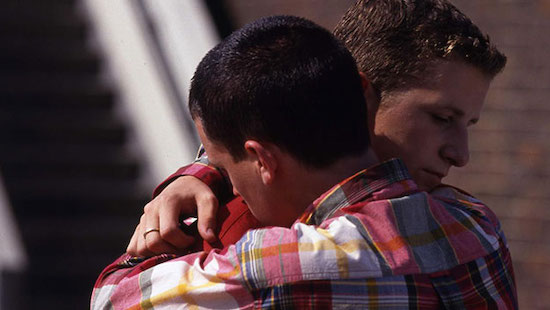LGBTQ+ cinema has a long history of protagonists meeting some kind of unhappy end – and so whenever there’s a film with a peaceful final shot, it creates a seismic reaction even when involving a mundane action, like a couple hugging or smiling at each other.
Growing up gay, it took me a while to officially come out because I was introduced to pictures that always ended in tragedy. Seeing movies about the trials and tribulations that the LGBTQ+ community face in real life gave me the initial notion that living openly was a burden. It wasn’t until after I had my coming out experience seven years ago at the age of 22 that I started watching queer films with peaceful happy endings – like the 1996 coming-of-age dramedy Beautiful Thing directed by Hettie MacDonald.
Based on the play of the same name by screenwriter Jonathan Harvey, Beautiful Thing follows two gay teenagers, Jamie and Ste, and their lives in Thamesmead, a working-class area in South East London. Once Ste stays over at Jamie’s flat one night with him and his bartender mother Sandra to keep away from his abusive family, they develop an instant romantic connection that they keep hidden from their respective loved ones.
25 years ago, Beautiful Thing was released in a post-Thatcher era where the controversial law known as Section 28 remained enforced up until it was finally repealed across the UK in 2003. When the law was passed on May 24th, 1988, teachers were prevented from having positive conversations about homosexuality with their students and councils were banned from funding any artistic medium, including books and movies, that depicted homosexual content. Given how the law was passed during the AIDS crisis, it only heightened the discrimination that the LGBTQ+ community was facing and made closeted teenagers feel like being queer was an immoral choice.
Thatcher’s controversial policies are what compelled Jonathan Harvey to write Beautiful Thing, which began life as a play which had its first stage production in 1993 and, like the film adaptation, was helmed by MacDonald. During an opening party at a 20-year anniversary production of the play on the West End back in 2013, Harvey, a former teacher, spoke with HomoLab about how it was unlawful to talk with students about being gay. According to Harvey, homosexuality was demonized because of the belief that gay people were solely defined by their sex drive. “That’s not how we define ourselves, so for me it was about readdressing that balance,” he explained.
The writer wanted to tell a simple story about two gay teens falling in love that served as a quiet act of defiance. Beautiful Thing doesn’t possess the same overt political activism present in such pictures as Pride or Beats Per Minute (BPM). Yet, because people like Thatcher were rattled by the simple idea of gay teenagers being proud and accepted, the story serves as its own act of politicking just by existing.
Thanks to jubilant needle drops and a buoyant romantic storyline, Beautiful Thing acts as a satisfyingly saccharine rally cry, a film that touches on the prejudice that teens like Jamie and Ste experience while still finding a balance between pragmatism and elation. The opening scene alone illustrates that mix, with Jamie being ridiculed by his classmates before brushing them off and heading back to his flat while the Mama Cass tune ‘It’s Getting Better’ plays over the opening credits.
During that scene, a rainbow in the sky nods to, for the first time of many, the fact that whenever Jamie and Ste experience a rough patch that feels like a rainstorm, a rainbow always follows. Their relationship and tumultuous journeys individually eventually culminate into a resonant happy ending, in which the couple slow-dance at the courtyard of their council estate to ‘Dream A Little Dream of Me’ by the Mamas and the Papas. As they start dancing, a huge crowd forms full of people who either look at Jamie and Ste with disdain or happily dance along with them.
Without giving a big speech, they reveal themselves in public while remaining focused on each other, oblivious to the intolerant looks being thrown their way. Together with their outspoken neighbor Leah, Sandra dances along with Jamie and Ste to make them feel less alone and ward off the bigots in the crowd with her piercing stare.
When the screen turns black, it’s unclear what kind of future Jamie and Ste head into. It won’t always be easy living openly, but they’re at least afforded the peaceful final shot that countless queer protagonists haven’t always had. In the decade the film came out in, it was especially commonplace to have gay characters end up alone or meeting a tragic demise.
Since it’s told primarily from Jamie and Ste’s perspective, Beautiful Thing also offered an antidote to the archetypal Gay Best Friend who always serves as an accessory rather than a full-fledged character. The Gay Best Friend’s purpose is often to provide sassy comic relief and romantic wisdom for the heterosexual protagonist, without their own love life being explored. Although the GBF doesn’t live in tragedy, and is sympathetic rather than villainous, characters like Christian from Clueless and Damian from Mean Girls still give Hollywood a way of saying they acknowledge that gay people exist – as long as they’re present on the periphery.
Between Hollywood sidelining and stigmatizing queerness, and the fact that Britain is still reeling from the damage caused by Section 28, Harvey’s beloved play still remains powerfully relevant. In the same interview with HomoLab, Harvey said he hopes the play becomes outdated, a sign of stronger societal acceptance of the LGBTQ+ community in the real world. But the powerful reaction the story triggers in people isn’t lost on him. Until we can see the day of such pride, we still have this potent gem of a film – proving that being different and falling in love can indeed be a beautiful thing.


